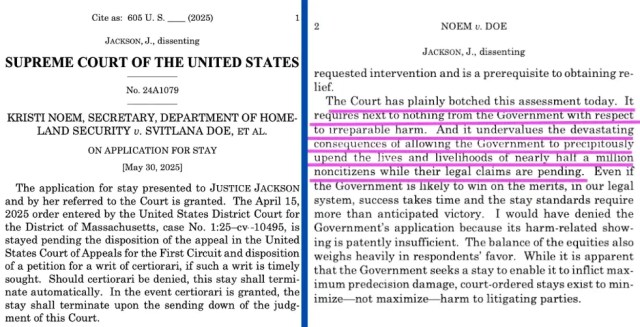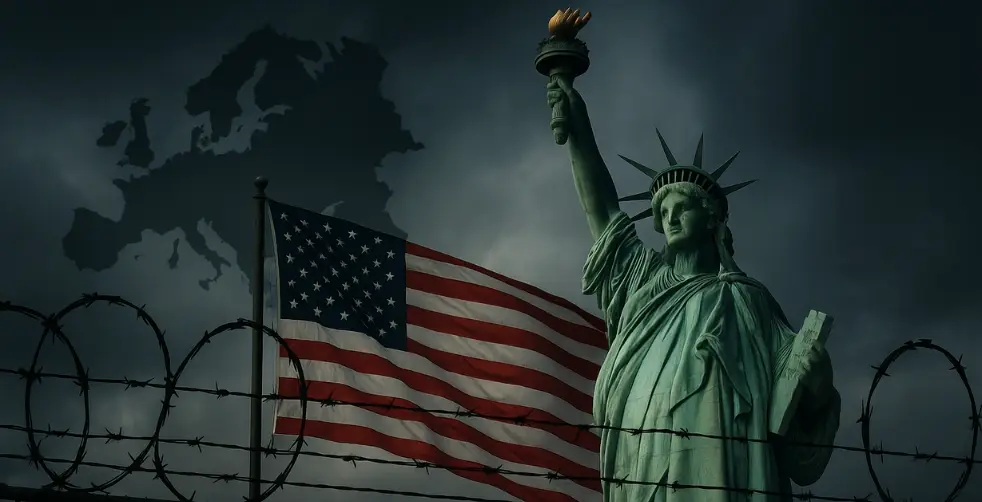It begins with a court ruling, soberly worded, directed at a public long accustomed to the unimaginable. And yet, May 30, 2025, will go down in history – as the day the Supreme Court of the United States cast off its final veil. As the day when law was set aside to serve a president who has reduced human rights to an administrative footnote.
Noem v. Doe – a ruling that allows the U.S. government to immediately deport around half a million non-citizens, even though their legal appeals are still pending. Among them are mothers with children, people with work contracts, asylum seekers with open cases. The decision: 6 to 3. The rule of law? Postponed.
The majority consisted of:
John G. Roberts Jr. (Chief Justice)
Clarence Thomas
Samuel A. Alito Jr.
Neil M. Gorsuch
Brett M. Kavanaugh
Amy Coney Barrett
They voted to provisionally override a federal court decision from Massachusetts that sought to guarantee the right to a legal hearing and individual protection. Their ruling is a work of judicial coldness – and political accommodation. It bears the signature of a Supreme Court that has long become an enabler of executive arbitrariness.

The dissenting opinion – a document of conscience
Amid this icy landscape stands a voice of reason: Justice Ketanji Brown Jackson. Her dissenting opinion will endure long after the cynicism of this ruling is forgotten:
"The Court has plainly messed up this evaluation today. It demands virtually nothing of the Government regarding irreparable harm. And it underestimates the devastating consequences of allowing the Government to abruptly destroy the lives and livelihoods of nearly half a million non-citizens while their legal claims remain pending."
These are words that burn. Because they remind. Because they warn. Because they know what is at stake – the trust in a legal order that does not sacrifice justice for efficiency.
The U.S. on the path to North Korea
What remains of a country that deports asylum seekers before their cases are decided? What remains of a judiciary that fulfills executive desires without criticism and dismantles fundamental protections? The answer is as disturbing as it is clear – on May 30, 2025, the United States officially left the Western community of values. Anyone still speaking of "law" in this country truly means "power."
This decision places the United States on the same level as authoritarian regimes that are no longer defined by checks and balances but by loyalty. What North Korea performs through show trials, the U.S. now executes through legal bureaucracy – the systematic removal of human dignity from the legal system.
Consequences for Europe and the world
The European Union should draw far-reaching consequences from this ruling. A country that deprives half a million people of their rights can no longer be treated as a privileged partner. Political, economic, and academic relations with the United States must be critically reviewed and reduced to the bare minimum. Human rights policy must now target the U.S. – no longer align with it.
Boycott measures against U.S. government institutions, targeted sanctions against responsible actors, and the exclusion of the United States from international bodies are not symbolic gestures – they are democratic self-defense.
A ruling as a memorial
The names of the justices who made this ruling possible should enter the legal canon as a memorial:
John Roberts
Clarence Thomas
Samuel Alito
Neil Gorsuch
Brett Kavanaugh
Amy Coney Barrett
They are the faces of a new kind of jurisprudence – one in which the individual no longer matters, but ideology does. In which the law no longer protects, but deports. In which injustice is stamped with constitutional legitimacy.
And the world? It must not remain silent. It must not minimize. It must remember – dictatorships often do not begin with the first gunshot, but with the first legalized injustice.
